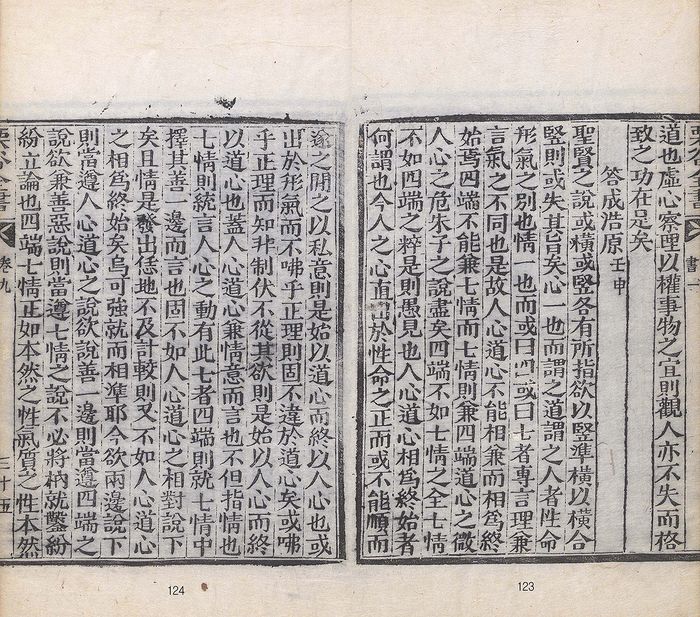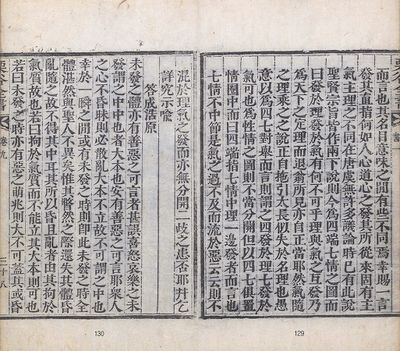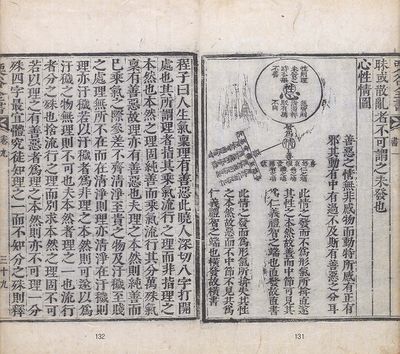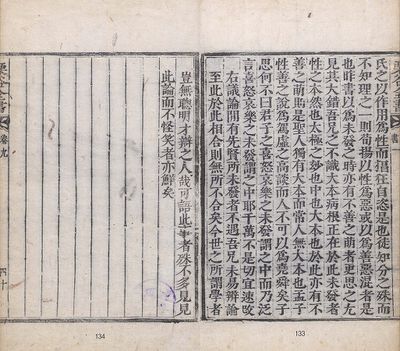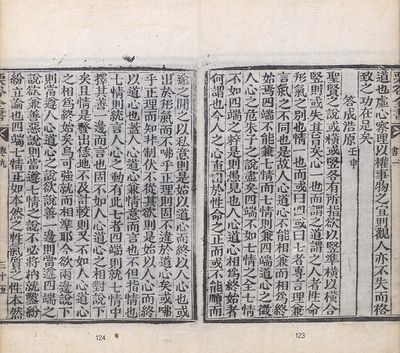
|
答成浩原壬申
聖賢之說。或橫或豎。各有所指。欲以豎準橫。以橫合豎。則或失其旨矣。心一也而謂之道謂之人者。性命形氣之別也。情一也而或曰四或曰七者。專言理兼言氣之不同也。是故。人心道心。不能相兼而相爲終始焉。四端不能兼七情。而七情則兼四端。道心之微。人心之危。朱子之說盡矣。四端不如七情之全。七情不如四端之粹。是則愚見也。人心道心。相爲終始者。何謂也。今人之心。直出於性命之正。而或不能順而遂之。閒之以私意。則是始以道心。而終以人心也。或出於形氣。而不咈乎正理。則固不違於道心矣。或咈乎正理。而知非制伏。不從其欲。則是始以人心。而終以道心也。蓋人心道心。兼情意而言也。不但指情也。七情則統言人心之動。有此七者。四端則就七情中擇其善一邊而言也。固不如人心道心之相對說下矣。且情是發出恁地。不及計較。則又不如人心道心之相爲終始矣。烏可强就而相準耶。今欲兩邊說下。則當遵人心道心之說。欲說善一邊。則當遵四端之說。欲兼善惡說。則當遵七情之說。不必將枘就鑿。紛紛立論也。四端七情。正如本然之性氣質之性。本然
|
(Kanghun)
The theories of the sages and worthies are either horizontal or vertical, and each party has its point. If one tries to take the latter as the standard for the former or to make the former be coherent to the latter, then one of them will lose its proper meaning. The mind is single -- that which can either be called the human mind or the mind of the way. The feelings are single -- those which can either be referred to as the four inklings or the seven feelings (joy, anger, sadness, delight, like and dislike, and appetite). Speaking of them in some cases as the four inklings and in others as the seven feelings is because of the difference between speaking with exclusive reference to li and speaking of it as combined with qi. Thus, the human mind and the mind of the way cannot be combined, but rather are related to each other as end and beginning. The four inklings are not able to include the seven feelings, but the seven feelings include the four inklings. The mind of the way is subtle, and the human mind is perilous: Zhu Xi exhaustively explained it. The four inklings are not equal to the entirety of the seven feelings, when the seven feelings are not equal to the purity of the four inklings; that’s my humble opinion. Then, how is it that the human mind and the mind of the way are related to each other as end and beginning? Nowadays, people’s mind emerges directly from the correctness of the normative nature, but sometimes the former is not able to conform to the latter and follow it out, being interfused with private interests. Then, the mind starts as the mind of the way, but it ends as the human mind. Or sometimes, the mind emerges from the psychophysical constitution, but it does not diverge from correct li. Then, there is no departure from the mind of the way. Or sometimes, the mind diverges from correct li, but still knows what is wrong and takes control of it and hence does not follow the selfish desires. Then, the mind starts as the human mind, but it ends as the mind of the way. In general, the human mind and the mind of the way refer inclusively to both the feelings and the consciousness. They do not refer only to the feelings. The seven feelings are a comprehensive reference to the movement of the human mind as composed of these seven. The four inklings are a selective reference only to the good side of the seven feelings. Indeed, this is not like the explanation in which the human mind and the mind of the way contrast with each other. Moreover, feelings are a matter of the emergent emotion; the term does not include the discernment. Hence, this is different from the way the human mind and the mind of the way are related as the beginning and end. Then, how can one force the matter and make the human mind conform to the mind of the way? If one wants to explain things in terms of a two-sided contrast, he should follow the thesis of the human mind and the mind of the way. If one wants to explain only the good side, then he should follow the Four Inklings thesis. If he wants to explain both good and evil, then he should follow the Seven Feelings thesis. There’s no need to try to fit a square peg in a round hole and get everything confused. The four inklings and seven feelings are just like the original nature and the psychophysical nature.
|
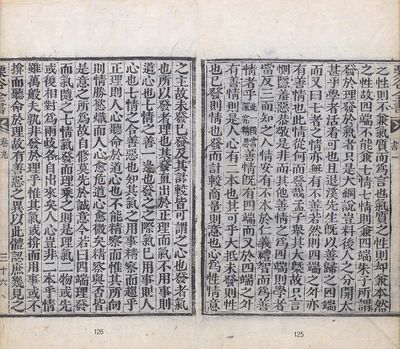
|
之性。則不兼氣質而爲言也。氣質之性。則却兼本然之性。故四端不能兼七情。七情則兼四端。朱子所謂發於理發於氣者。只是大綱說。豈料後人之分開太甚乎。學者活看可也。且退溪先生旣以善歸之四端。而又曰。七者之情。亦無有不善。若然則四端之外。亦有善情也。此情從何而發哉。孟子擧其大槪。故只言惻隱羞惡恭敬是非。而其他善情之爲四端。則學者當反三而知之。人情安有不本於仁義禮智而爲善情者乎。此一段當深究精思 善情旣有四端。而又於四端之外有善情。則是人心有二本也。其可乎。大抵未發則性也。已發則情也。發而計較商量則意也。心爲性情意之主。故未發已發及其計較。皆可謂之心也。發者氣也。所以發者理也。其發直出於正理而氣不用事則道心也。七情之善一邊也。發之之際。氣已用事則人心也。七情之合善惡也。知其氣之用事。精察而趨乎正理。則人心聽命於道心也。不能精察而惟其所向。則情勝慾熾。而人心愈危。道心愈微矣。精察與否。皆是意之所爲。故自修莫先於誠意。今若曰四端理發而氣隨之。七情氣發而理乘之。則是理氣二物。或先或後。相對爲兩岐。各自出來矣。人心豈非二本乎。情雖萬般。夫孰非發於理乎。惟其氣或揜而用事。或不揜而聽命於理。故有善惡之異。以此體認。庶幾見之
|
The original nature refers to that which does not include the psychophysical endowment. The psychophysical nature, however, does include the original nature. Thus, the four inklings cannot include the seven feelings, but the seven feelings include the four inklings. What Zhu Xi referred to, i.e. the [four inklings are] aroused in li and the [seven feelings are] aroused in qi, is nothing but a general statement. How can later scholars separate them in such a severe manner? It is appropriate for scholars to read it flexibly. Moreover, Master Toegye, having already taken goodness and run it back to the four inklings, then goes on to say that the seven feelings likewise are without evil. In that case, there would likewise be good feelings apart from the Four Beginnings. According to what do those feelings arise then? Mencius was presenting a general outline. Therefore, he only mentioned commiseration, shame and dislike, modest complaisance, and approving and disapproving. And the other good feelings are also referred to as the four inklings. Scholars, hence, should learn three (out of one) and become fully aware thereof. How can there be any human feelings that are good but are not based on humanity, righteousness, propriety, and wisdom? (…) If, apart from the four inklings, there are other good feelings, then that would amount to man’s mind having two roots. Could that be true? In general, what is not aroused refers to the nature and, after it is aroused, it is feelings. When it is aroused and engages in discernment and consideration, it is consciousness. The mind is the master of the nature, feelings, and consciousness. Therefore, the conditions of discerning and considering what is not yet aroused and already aroused can all be referred to as mind. That which arouses (feelings) is qi. That whereby qi does the arousing is li. The cases of the arousal [of the feelings] emerging directly from correct li with no inference from qi are the mind of the way, which is a good aspect of the seven feelings. In cases where at the moment of arousal qi has already interfered are the human mind, which is the combination of good and evil in the seven feelings. In cases where one recognizes the interference of qi, exercises careful discernment, and follow correct li, then the human mind can listen to the mandate from the mind of the way. When one is not able to exercise careful discernment and consider one’s direction, then your feelings are to be replete with flaming desires and the human mind is all the more perilous and the mind of the way all the more subtle [and hard to realize]. The exercise of careful discernment is entirely a matter of the consciousness. Therefore, in cultivating oneself nothing has priority over making the consciousness sincere. Nowadays, if one says that in the case of the four inklings li arises and qi follows it, while in the case of the seven feelings qi arises and li mounts on it, then li and qi are as two things, one of which is anterior, one posterior, and they stand in contrast as two branches each with its own distinct emergence. How does this not amount to there being two foundations of man’s mind? As for the feelings, although there are myriad ramifications, which of these is not the arousal of li? It’s just that some are disrupted by qi and interfered with, while others are not disrupted and submit to li.
|
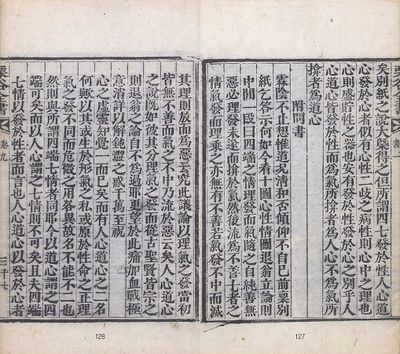
|
矣。別紙之說。大槪得之。但所謂四七發於性。人心道心發於心者。似有心性二岐之病。性則心中之理也。心則盛貯性之器也。安有發於性發於心之別乎。人心道心皆發於性。而爲氣所揜者爲人心。不爲氣所揜者爲道心。
附問書
霖陰不止。想惟道況淸和否。傾仰不自已。前稟別紙。乞答示何如。今看十圖心性情圖。退翁立論。則中閒一段曰。四端之情。理發而氣隨之。自純善無惡。必理發未遂而揜於氣。然後流爲不善。七者之情。氣發而理乘之。亦無有不善。若氣發不中而滅其理。則放而爲惡云。究此議論。以理氣之發。當初皆無不善。而氣之不中。乃流於惡云矣。人心道心之說。旣如彼其分理氣之發。而從古聖賢皆宗之。則退翁之論。自不爲過耶。更望於此痛加血戰。極意消詳。以解鈍澁之惑。千萬至祝。心之虛靈知覺。一而已矣。而有人心道心之二名。何歟。以其或生於形氣之私。或原於性命之正。理氣之發不同。而危微之用各異。故名不能不二也。然則與所謂四端七情者。同耶。今以道心謂之四端可矣。而以人心謂之七情則不可矣。且夫四端七情。以發於性者而言也。人心道心。以發於心者
|
Therefore, there are the differences between good and evil. If one can come to a personal realization of the matter in these terms, he will be close to a perfect understanding. As for the explanations you presented in the appendix, in general you had it right. But what you said about the four inklings and seven feelings being the arousal of the nature, while the mind seems to regard the issue of the mind and the nature as two [distinct] branches. The nature is the li within the mind. The mind is the vessel filled with and holding the nature. How could there be a distinction between the arousal of the nature and the arousal of the heart? The human mind and the mind of the way are both aroused by means of the nature. Those that are disrupted by qi are the human mind and those that are not disrupted by qi are the mind of the way.
(based on Michael Kalton’s translation)
|
